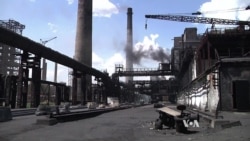A coking plant in Ukraine, one of Europe's largest, has been caught in the front-line fire between Russia-backed rebels and government forces hundreds of times. In recent weeks, the plant appears to have become a direct rebel target, and some fear the separatists may try to seize it.
Several workers at the Avdiivka Coking Plant have been fatally hit in the crossfire, and more than 50 have been wounded. In late May, the area was shelled 45 times in a single day — the most intense bombardment since fighting broke out.
Plant general director Musa Magomedov contended that rebels "were shooting at us directly, and the shells came from behind the border territories," which is where the rebels are.
The plant makes coke, a fuel for metal production, and thousands of jobs here and in steelworks across Ukraine depend on its continued operation.
That also gives the plant a strategic value that makes some worry the rebels may try to seize control of it and the nearby town of Avdiivka.
“It goes without saying that we are afraid that the military activities can start again in the territory of Avdiivka," Magomedov said. "And, taking into account the factory is located five kilometers from the front line, we are worried and scared. But, on the other hand, what can we do in this situation?”
The shelling damages ovens, which are under constant repair to prevent the plant from shutting down. Restarting it would take up to 10 years and involve astronomical costs.
So the factory's 1,700 workers, like Vladimir Borzenko, live on-site in underground facilities to avoid the shelling — which comes mainly at night..
“This factory is the foundation of the city," Borzenko said. "So, if there is no factory, there is no city. There is no place to work [in this city] other than the factory. Almost all factories here before are not working anymore because of the situation.”
The factory's medical department has stocked up on extra bandages and made a list of volunteer nurses should extra help be needed.
“We are ready to receive, I wouldn’t say 50 people [at once]," said department head Sergey Hila, "but if 10 or 15 [are wounded], we are ready to give them anti-shock treatment and surgical help and further transportation to the nearby town hospital."
Magomedov is confident Ukrainian forces can defend the plant but admits it is so close to rebel lines that it could easily be shelled to pieces.
While workers hope for a political solution, the plant struggles to keep up with the ever present reality of war.





